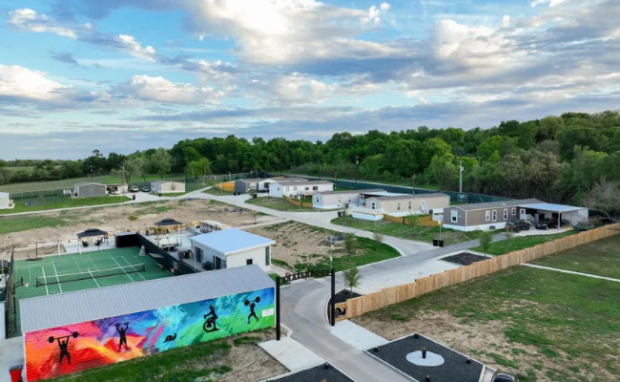

Japanese urban developer N-Ark will create Dogen City, a floating metropolis resistant to climate change. A ring surrounds this smart city, preventing tsunamis from devastating its structures. Moreover, it will harness the ocean to become a self-sufficient beacon of global healthcare.
We have integrated technologies so deeply into our lives that we have smart homes and devices. Inevitably, we would expand our innovations to transform our wider communities. Smart city projects like N-Ark’s could improve our quality of life and secure a brighter future for humanity.
This article will elaborate on Dogen City’s design and development. Later, I will discuss other smart city projects like Telosa and Elon Musk’s Snailbrook. Consequently, you’ll see how many experts have been trying to create futuristic communities.
How will Dogen City work?
The Dogen City website illustrates this urban development as a floating concrete jungle surrounded by a giant ring. Car news website Autoevolution says it is 4 km (2.5 miles) wide that will house 30,000 tourists and 10,000 residents.
Yet, it contains water, where its inner buildings float. The website describes the concept as a “smart healthcare city floating on the sea that integrates food environment, architecture, data, energy, and ocean resource with a focus on healthcare.” Also, it has three parts:
- RING is the habitable outer city layer. Its inner structure resembles a ship’s hull, protecting the inhabitants from waves and other weather conditions. Also, it contains critical infrastructure like water, energy, and sewage.
- Floating Architecture refers to the floating buildings inside Dogen City. Sustainability news website One Green Planet says these include a sports stadium, parks, residential hotels, and places of worship.
- Underwater Edge Datacenters operates Dogen’s operating system, healthcare data analysis, and drug discovery simulation. Moreover, N-Ark intentionally placed them underwater for natural cooling and cyberattack protection.
You may also like: Google is testing its medical AI chatbot
Dogen City will sustain itself using N-Ark’s first green project, Floating Farm. It “utilizes lightweight, low environmental impact building materials and renewable energy to enable offshore agriculture and aquaculture complexes.”
The system collects rainwater and mixes it with salt water to sustain crops with the proper pH levels. At the time of writing, the project grew tomatoes, lettuce, and kaiware daikon radish. N-Ark used Floating Farm to support plant species no longer available in Lake Hamana.
Dogen City is an ambitious project that could inspire others to create sustainable living worldwide. N-Ark hasn’t disclosed many important details, such as the smart city’s total cost. Still, Autoevolution says Dogen City will open in 2030.
Other smart cities in development

Photo Credit: globalnews.ca
The United States has been planning numerous smart city projects lately. For example, billionaire Marc Lore announced he would revolutionize the modern city model with his Telosa City.
It is a massive 150,000-acre urban landscape in the middle of a desert. He initially wanted to build it in the Appalachian region before choosing three potential locations: Arizona, Nevada, and Utah.
Lead architect Alana Goldweit says Telosa will have 36 mixed-use districts enabling residents to reach necessities in 15 minutes. In other words, it will follow the modern “15-minute city” model.
Telosa City will also have organic skyscrapers, community parks, and monorails to offer convenient access to nature. Like Dogen City, it will prioritize sustainability by using renewable energy.
Marc Lore says his urban project will test a new economic model called “Equitism.” It will enable citizens to join a foundation that owns the city’s land.
You may also like: Netflix improves green-screen filmmaking with AI
The group could sell plots as their value increases, funding the city’s endowment. Then, the latter will pay for social programs like healthcare, education, and job training.
Meanwhile, X social media owner Elon Musk says he will create a city called Snailbrook in Bastrop County. The latter’s namesake originates from his Boring Company’s shelled mascot.
Unlike Dogen and Telosa, it will house employees of Tesla, SpaceX, and Boring Company. They will pay $800 monthly, significantly less than Bastrop’s average rent of roughly $2,199.
Conclusion
Japanese urban development firm N-Ark will create a floating smart city named Dogen City. It is an autonomous structure that will facilitate healthcare research.
It claims it will complete the project in 2030. Also, others like Elon Musk and Marc Lore use the latest technologies to create futuristic urbanscapes.
We would have to wait to see them in real life. Regardless, technology continues to transform other parts of daily life. Learn how to adapt to these changes by following Inquirer Tech.
Read Next
EDITORS’ PICK
Subscribe to INQUIRER PLUS to get access to The Philippine Daily Inquirer & other 70+ titles, share up to 5 gadgets, listen to the news, download as early as 4am & share articles on social media. Call 896 6000.
For feedback, complaints, or inquiries, contact us.
Read the full article on real estate tech innovations, or, read more news about real estate investing in Arizona. We welcome and encourage you to recommend our site to your fellow investors, letting them benefit from the valuable insights we provide. Thank you!





